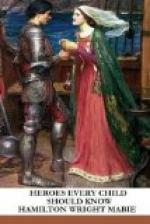On arriving at Kalawao we speedily found ourselves inside the half-finished church which was the darling of his heart. How he enjoyed planning the places where the pictures which I had just brought him should be placed! By the side of this church he showed me the palm-tree under which he lived for some weeks when he first arrived at the settlement, in 1873. His own little four-roomed house almost joins the church.
After dinner we went up the little flight of steps which led to Father Damien’s balcony. This was shaded by a honeysuckle in blossom. Some of my happiest times at Molokai were spent in this little balcony, sketching him and listening to what he said. The lepers came up to watch my progress, and it was pleasant to see how happy and at home they were. Their poor faces were often swelled and drawn and distorted, with bloodshot goggle eyes.
I offered to give a photograph of the picture to his brother in Belgium, but he said perhaps it would be better not to do so, as it might pain him to see how he was disfigured. He looked mournfully at my work. “What an ugly face!” he said; “I did not know the disease had made such progress.” Looking-glasses are not in great request at Molokai!
While I sketched him he often read his breviary. At other times we talked on subjects that interested us both, especially about the work of the Church Army, and sometimes I sang hymns to him—among others, “Brief life is here our portion,” “Art thou weary, art thou languid?” and “Safe home in port.” At such times the expression of his face was particularly sweet and tender. One day I asked him if he would like to send a message to Cardinal Manning. He said that it was not for such as he to send a message to so great a dignitary, but after a moment’s hesitation he added, “I send my humble respects and thanks.” I need scarcely say that he gave himself no airs of martyr, saint, or hero—a humbler man I never saw. He smiled modestly and deprecatingly when I gave him the Bishop of Peterborough’s message—“He won’t accept the blessing of a heretic bishop, but tell him that he has my prayers, and ask him to give me his.” “Does he call himself a heretic bishop?” he asked doubtfully, and I had to explain that the bishop had probably used the term playfully.
One day he told me about his early history. He was born on the 3rd of January, 1841, near Louvain in Belgium. On his nineteenth birthday his father took him to see his brother, who was then preparing for the priesthood, and he left him there to dine, while he himself went on to the neighbouring town. Young Joseph (this was his baptismal name) decided that there was the opportunity for taking the step which he had long been desiring to take, and when his father came back he told him that he wished to return home no more, and that it would be better thus to miss the pain of farewells. His father consented unwillingly, but, as he was obliged to hurry to the conveyance which was to take him home, there was no time for demur, and they parted at the station. Afterward, when all was settled, Joseph revisited his home, and received his mother’s approval and blessing.




